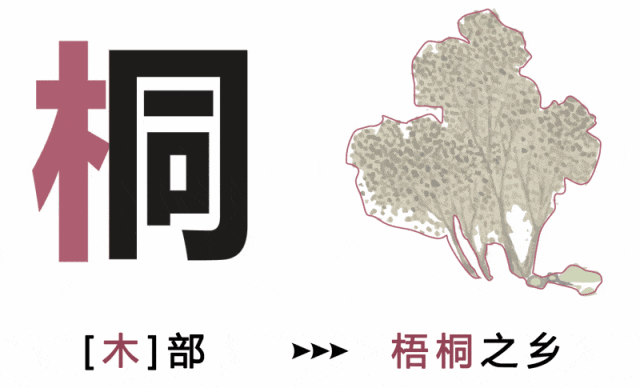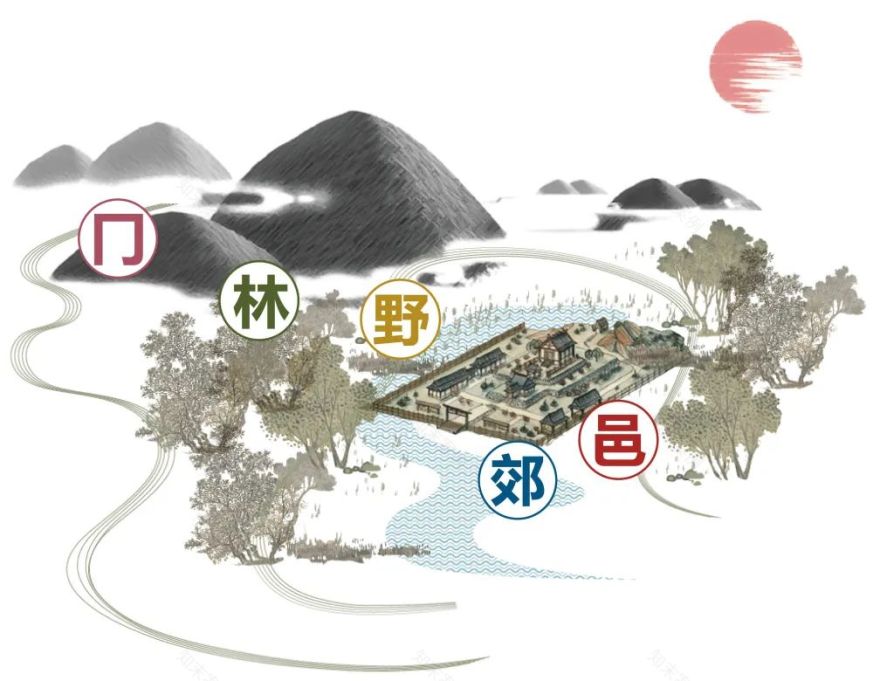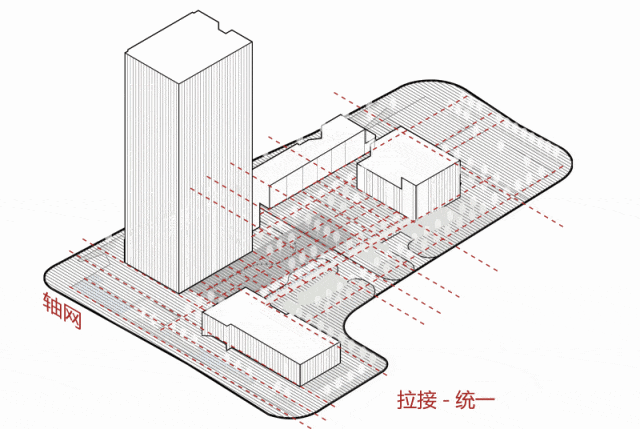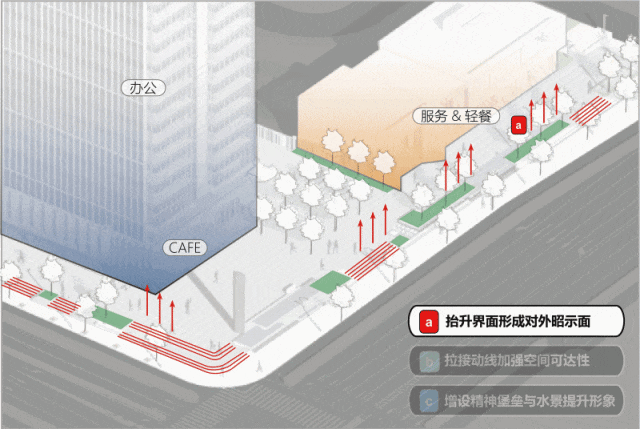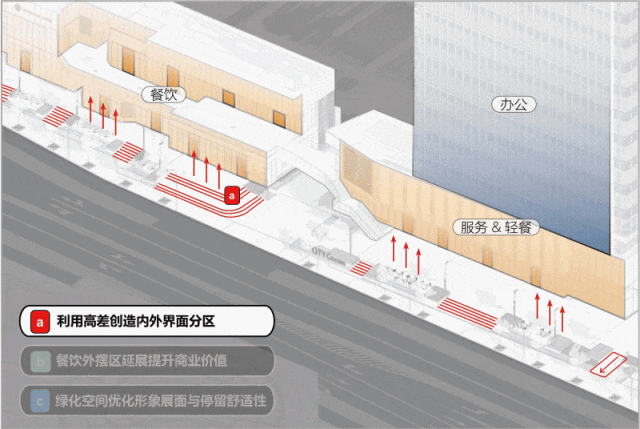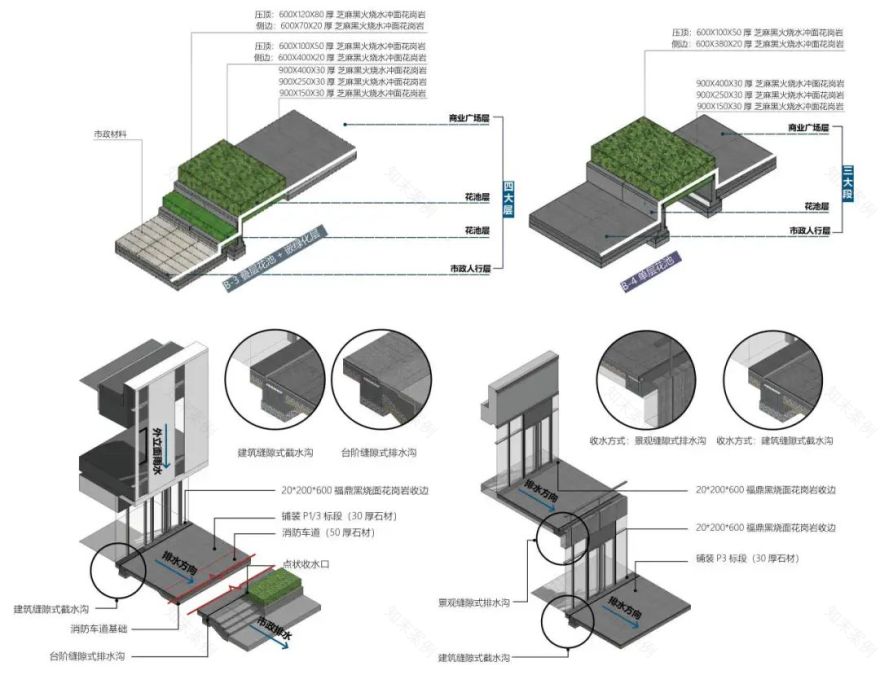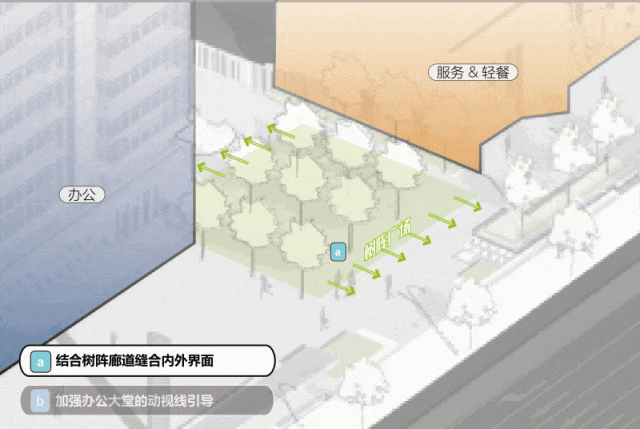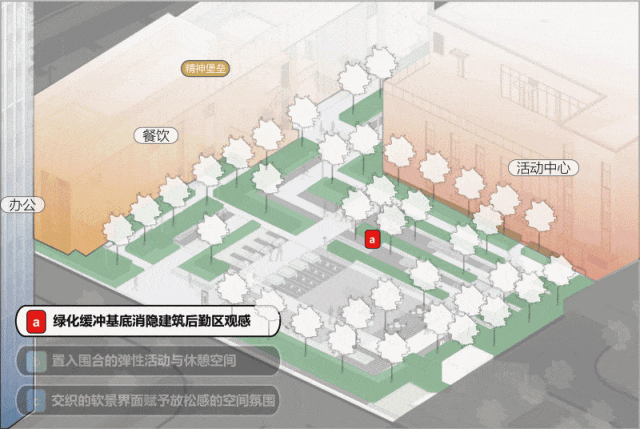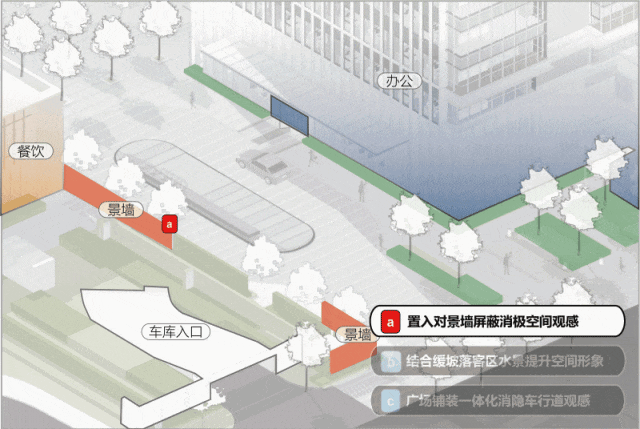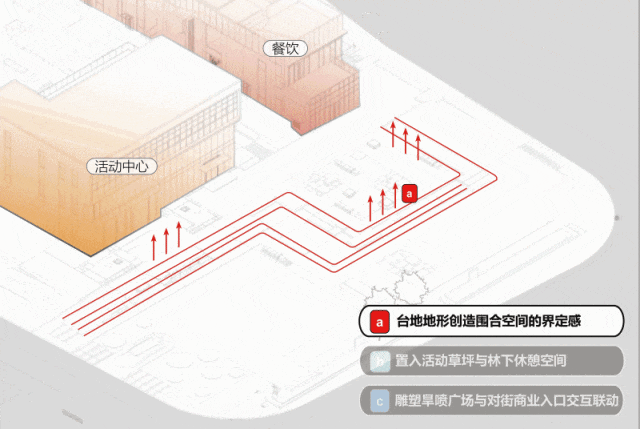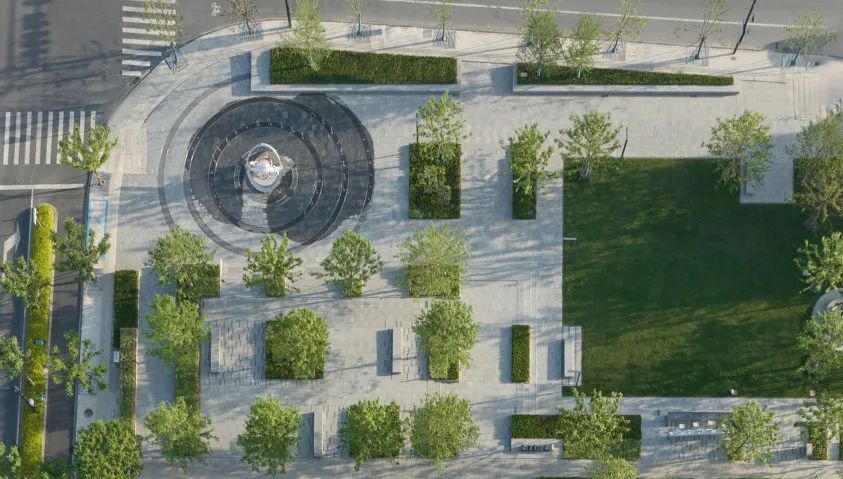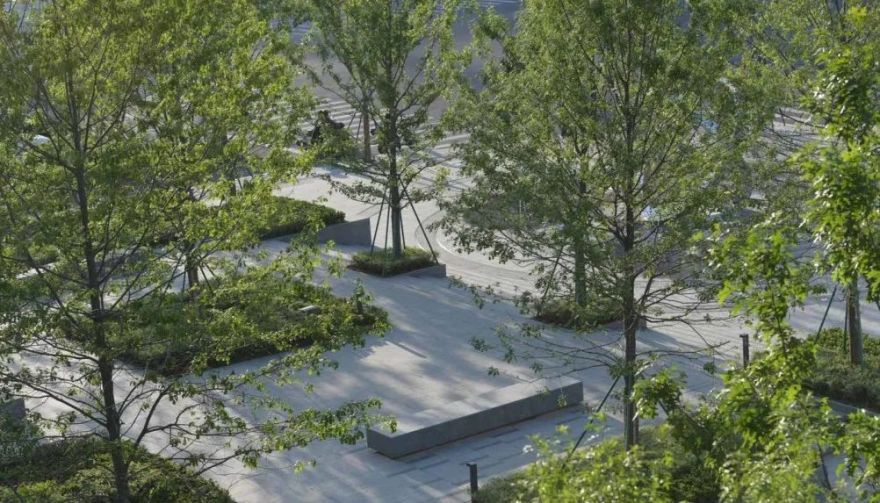查看完整案例


收藏

下载
从‘桐’字拆解到空间体系演绎——华润桐乡杨家门商办景观设计
Disassembly of Character into Spatial Systems——Tongxiang Yangjiamen Office and Mixed-use Landscape
►基地概括 Site Overview
桐乡杨家门商办项目位于桐乡老城区的核心区位,紧邻桐乡主要城市商业核心。基地南侧有形象展示区,且衔接城市形象轴-振兴中路;项目北侧有社区活动中心,并衔接城市绿带-杨家门路。基地的西面设有办公塔楼与沿街商业,整体围合出一个内向型庭院空间。项目的主要属性为办公,但同时也需兼顾沿街商业与周边居民公共空间的多元活动需求。
Yangjiamen Mixed-use Project is located in the heart of the historic city of Tongxiang. South of the project is the main city axis of Zhenxing Middle Road; the north side connects to the city green loop of Yangjiamen Road, and the west is adjacent to a future retail complex across the street. The layout consists of a central courtyard surrounded by buildings of various functions, and the public realm will cater for the needs of future high-end office users as well as the local community.
►基地痛点分析 Site Problems
►设计概念 Concept Origin
基地位于桐乡老城区的核心区位,设计团队希望透过本项目诠释并传达当地城市记忆与精神。桐乡为梧桐之乡,我们在设计之初受到汉字文化博大精深的启发,由“桐”字开始延展本案的设计主题。
The design seeks to integrate the inherent cultural spirit of the city into the centrally-located project of Tongxiang, and the team was inspired by the profound meanings embedded in Chinese characters of the name of Tongxiang.
当我们从[桐]字提炼出[木]部、[口]部、[冂]部三大特征时,发现了这些汉字部首与基地本身存在着非常有意思的空间关联与遐想。
[Tong] consists of three components - [Mu], [Kou] and [Jiong]. During the ideation process, the design team found intriguing correlations with the site that are particularly interesting.
[木]部 = 即树,桐乡为梧桐之乡。古有梧桐,凤凰来栖。
Component of [Mu] = Meaning trees, also reflecting the name of Tongxiang being named after the city of Phoenix Trees.
[口]部=犹如一个院落,呼应本项目以院落为核的空间格局。
Component of [Kou] = Pictographically representative of a courtyard layout similar to the layout of the project.
[冂]部=即内外之地。根据辞海的释义,我们从中发现了一段特别有意思的描述:
Component of [Jiong] = Meaning territories far and beyond the city limit. According to the definition based on Chinese dictionary:
邑外谓之郊,郊外谓之野,野外谓之林,林外谓之冂。以前的城邑之外称之为郊,郊外为人迹罕至的野,郊野之外还有自然的林区,而林区之外的地方则称之为冂,意味着都邑的远郊之境。
A city surrounded by walls is called [Yi]; area in the vicinity of city wall is called [Jiao]; further out into the wilderness is called [Ye]; territories even further away is typically called [Lin]; and the territories that are extremely far is called [Jiong].[Yi] = The City; [Jiao] = The Suburb; [Ye] = The Field; [Lin] = The Forest; [Jiong] = The Periphery.
►概念解读 Concept Interpretation
我们希望于桐乡市中心树立一个新旧交织且富有质感体验的城市形象商务中心,景观设计透过分层设计手法引入[邑、郊、野、林、冂]的五大空间体系,采用简洁统一的设计语言定义空间景观并拉接场地内外的关系。设计团队对场地视线、动线、功能及微气候进行了深度分析,运用场景缝合的设计手法将多元属性进行融合,打造共享性的多元城市边界。
Through the layering of [Yi], [Jiao], [Ye], [Lin] and [Jiong] as drivers of spatial systems, the design aims to achieve integratedness, stitching together strong multiplicity of textural and experiential qualities.
在这个新旧交融的时空里,我们以抽象化的空间体系来重新演绎和拆解时间与空间的复合关系。结合基地的空间特性,设计团队将场地划分为由内而外的五大分区场景:[邑、郊、野、林、冂],营造递进式的序列体验,以空间体系拉接界面属性,并赋予场地丰富的质感体验。
In this time and space where the old and the new co-exist, abstraction of spatial systems - [[Yi], [Jiao], [Ye], [Lin] and [Jiong] is critical in our approach when implementing design thinking into problem-solving of the site. The design reflects spatial compositions that aim to seamlessly blend different interface attributes into one cohesive public realm.
五大分区落位:邑、郊、野、林、冂
Spatial Systems of [Yi], [Jiao], [Ye], [Lin] and [Jiong]
冂【Jiong】►形象昭示外界面 Project Signification Streetfront
项目南侧界面紧邻桐乡城市轴-振兴中路,路口的对街将建成未来当地的指标性商业综合体,因此该路口的景观空间打造以形象昭示为主。我们利用高差结合对外展示的观赏性水景与精神堡垒等要素形成昭示面,并通过对空间体量、材质和细节的推敲,使景观大气而稳重的属性得以彰显。
The south interface of the project is situated along Tongxiang City Axis - Zhenxing Middle Road, and across the intersection there will be a commercial retail complex to be built in the future. The design of this streetfront interface is focused on project identity display. The design team integrates elements such as water features and signification signages to highlight the display quality of the space.
城市街角增加精神堡垒与水景彰显项目品质与昭示性
体量嵌合的空间构成,创造景观昭示面
利用高差创造水景的跌水面
水景与跌水元素的精细化节点设计详图
►外摆餐饮外界面 F&B Lifestyle Streetfront
西侧界面以商业裙房为主且沿街规划有餐饮业态,对街未来也将建成全新的商业综合体。我们借用了现状的地势高差,以错落的台阶和平台创造出一系列与外摆弹性交融的形象展面。靠商业内侧较高处预留了餐饮的专属外摆空间,靠外侧则界定为通行性空间,将空间机能有效区分并相互交融。
The west streetfront faces the future retail complex and consists of food and beverage businesses along the interface. The design takes into account of the existing landform and creates a series of outdoor dining areas, seating edges and steps to differentiate functions along the streetfront into outdoor dining zones next to the shops and circulation zone adjacent to the roadway.
种植区结合节点停留,形成一体化休憩型边界
前后错落的空间布局优化沿街游逛体验
界面交接与排水模块详图展示
郊【Jiao】
►树阵过渡广场 Transitional Tree Plaza
由于塔楼办公的大堂入口朝向内部中庭,位置较为隐蔽,我们在相邻的南侧城市界面上结合树阵的设计缝合并拉接内外关系。树阵入口产生了明确的空间引导性,且营造了舒适的抵达界面,供在城市中奔波忙碌的人们短暂驻足,创造出放松的过渡型庇护空间。
The entry into the office lobby is relatively secluded and tucked away in the courtyard. The design creates a tree-lined plaza to connect the transitional in-between spaces, framing the space and acting as spatial guidance to provide a semi-sheltered arrival experience for the office users.
以树阵缝合界面形象,形成过渡型庇护空间
树阵廊道提供从城市界面的视线与动线引导
客制化树篦子设计详图展示
野【Ye】►休憩办公中庭 Office Recreation Courtyard
办公中庭虽为本案的核心区,但同时也存在较多的先天不利因素。中庭的北侧与西侧为建筑后勤空间,东侧相邻地库坡道,且南侧还有车行道路的横穿。基于这些条件,我们在设计中置入了多层次的绿化缓冲基底,以内向围合的布局形式打造沉浸式的休憩与社交氛围。中心区设有弹性的办公休闲外摆,边界处结合了小组洽谈与独处型口袋空间,打造一个与闹市隔绝的惬意场所,让办公人群能够在此休憩、放松、产生交流。
Although the courtyard is located at the center of the site, there are a number of unfavorable factors affecting the place-making of the space. The northern and western edges of the courtyard have back-of-house logistic functions; the eastern edge is adjacent to a vehicular ramp, and the southern edge is cut off by an internal vehicular road. Based on these unfavorable conditions, the design team strategically integrates layers of vegetational buffers to screen the views and creates an inward-facing layout that encourages users to rest, relax and communicate in the garden. The immersive experience consists of a flexible garden plaza at the center with outdoor workstations and pocket spaces allocated at landscape edges.
多层次的绿色基底消隐建筑后勤区观感
交织的软硬界面创造放松的空间过渡关系
中心区弹性休憩外摆,兼容小型商务聚会
与绿化相嵌的小组洽谈空间形成了向内围合的停留边界。
中庭动线与弹性功能区相连接,动静分区有效过渡
品质感的放松社交中庭结合可移动式家具
邑【Yi】►景观入口大堂 Landscape Arrival Lobby
塔楼办公的大堂入口与落客位于消防登高场地,设计较为受限,且大堂对景存在车库坡道等不利因素。设计团队利用标识景墙屏蔽对景的不良空间观感,且同时加强了办公区域的庄重感。我们设置了薄水面的缓坡水景结合于落客区中岛,既满足了消防登高面的要求,也营造出更加专属的品质办公形象。当视线随着高耸的办公建筑逐渐过渡到地面空间时,现代感的水景元素变成了主导,将项目的宏观印象切换成人性化的空间体验,而水面上涟漪的光影也让人们能够产生与自然的情绪共鸣。
The lobby entrance and drop-off area of the office tower is located on fire-fighting zone, and the views looking out from the lobby is a basement Parking ramp. The design team integrates logo display walls to screen unfavorable views, and at the same time, strengthens the integrity framing the entry experience. At the center of the arrival space, a gently sloped water feature with a thin water membrane highlights the exclusivity for the office tower. As we shift away the views from the grand perception of the tower to the landscape space on the ground, the water feature becomes the dominant experiential element that showcases an impression of rippled light reflections, allowing joyful resonance with the natural setting.
消防登高面上的薄水面缓坡水景,结合于办公落客区中岛
对特色水景材质和细节的推敲,精致而稳重的属性得以彰显
薄水面缓坡水景精细化节点展示
水面涟漪的光影与大堂对景景墙相互辉映
对景墙模块与设计详图展示林
【Lin】►林下社区绿地 Forested Community Greenspace
项目的北端衔接杨家门路的市政绿带,活动中心建筑也能够为未来社区的参与和互动带来更多复合性。我们希望该空间可供人们停驻休憩,形成参与性强的公共城市边界。设计团队在这里设置了草坪式的户外聚集场所,并结合林下口袋休憩将场所活动连结起来。位于路口的街角设有一个小型雕塑旱喷广场,将与未来对街的商业综合体入口相互辉映,形成视线与空间序列上的拉接与延续。
The northern edge of the site is a part of the city green loop that connects to the municipal green belt of Yangjiamen Road. The community center that sits at the streetfront activates future use of the public greenspace. The design team aims to encourage participation and interaction by introducing an activity lawn and a series of pocket seating spaces under the tree-lined forest. At the corner of the intersection, the design of dry fountain plaza and art sculpture highlights the community vibe of Yangjiamen and connects to the future entry plaza of the commercial complex across the street.
街角处设有雕塑旱喷广场,形成对街商业广场空间序列延续
林荫下的口袋休憩空间融合了细腻的铺砖肌理变化
叠合的台地地形高差处理,形成半围合的开放型公共空间
简约稳重的 LOGO 与种植搭配组合,彰显项目品质
活动中心建筑外的弹性草坪活动区,拉接多元活动
夜景的雕塑旱喷广场赋予全时段的活力氛围
简洁当代的空间气质,相互交融的空间界面
项目名称:华润桐乡杨家门商办景观设计
项目地点:浙江省嘉兴市桐乡市振兴路与新永丰路十字路口
景观面积:15500 sqm
甲方团队:华润置地华东大区
景观设计:FLO 景观设计事务所
景观设计团队:付凯、王银旗、葛雨鑫、王威、陈润佳、熊陆辉、梁永德、刘琨
施工图设计:上海兰境景观设计咨询有限公司
施工图设计团队:乐荣,昋小刚,赵志昂,张苗苗,游雅丽
项目时间:2020.11-2023.04
摄影团队:南西空间影像
文章编辑:FLO 刘阳
客服
消息
收藏
下载
最近






